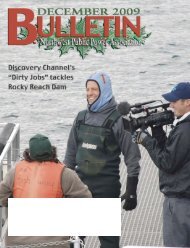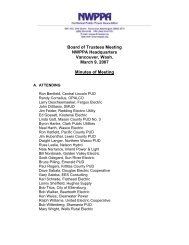by Scott M. Lindsay - Northwest Public Power Association
by Scott M. Lindsay - Northwest Public Power Association
by Scott M. Lindsay - Northwest Public Power Association
Create successful ePaper yourself
Turn your PDF publications into a flip-book with our unique Google optimized e-Paper software.
Training Opportunities<br />
ENVIRONMENTAL TASK FORCE MEETING<br />
Who Should Attend: Utility environmental professionals<br />
(new and experienced), government agency<br />
staff, vendors, and anyone who is tasked with or<br />
interested in environmental issues, regulatory compliance<br />
or mitigation, in the environmental arena<br />
of electric utilities.<br />
Overview: The long-standing Environmental Task<br />
Force is open to all. This meeting occurs three<br />
times each year to review and discuss new and<br />
proposed regulations and issues facing each utility,<br />
to discuss new methods and techniques, to hear<br />
from subject matter experts on key issues of the<br />
day, and to hear from selected vendors with new<br />
technology or services. The meeting is typically followed<br />
on the next day with training on an environmental<br />
topic.<br />
SEPTEMBER 21, 2009 — PORTLAND, ORE.<br />
HAZWOPER 8-HOUR FIRST RESPONDER<br />
AWARENESS/RECERTIFICATION TRAINING<br />
FOR UTILITY PERSONNEL<br />
Who Should Attend: First responders who are<br />
likely to witness or discover a hazardous substance<br />
release and need to initiate an emergency response<br />
sequence <strong>by</strong> notifying the proper people. The first<br />
responder shall have received at least eight hours<br />
of training.<br />
Overview: Refresh your knowledge and understanding<br />
of the requirements for hazardous waste<br />
operations and emergency response (HAZ-<br />
WOPER), as required <strong>by</strong> 29 CFR 1910.120. This<br />
course also helps to satisfy the annual HAZ-<br />
WOPER training required for recertification. This<br />
course is designed to train operations-level responders<br />
to take defensive actions to a hazardous materials<br />
spill.<br />
SEPTEMBER 22, 2009 — PORTLAND, ORE.<br />
NWPPA/NRECA STRATEGIC PLANNING, 2630.1<br />
Who Should Attend: Cooperative board members.<br />
Overview: Boards have ultimate responsibility for<br />
ensuring and evaluating the long-term health of the<br />
organization. They help fulfill this duty <strong>by</strong> identifying<br />
goals through strategic planning and <strong>by</strong> authorizing<br />
the appropriate allocation of resources<br />
through the adoption of financial policies and <strong>by</strong><br />
budget review and approval.<br />
SEPTEMBER 22, 2009 — SAN DIEGO, CALIF.<br />
NWPPA/NRECA ENERGY EFFICIENCY,<br />
CONSERVATION, AND DEMAND RESPONSE<br />
IN TODAY’S ELECTRIC COOPERATIVE<br />
Who Should Attend: Cooperative board members.<br />
Overview: The unprecedented growth in demand<br />
for energy will have significant impact on consumers<br />
and utilities everywhere as resources<br />
become scarcer and prices move higher. This<br />
course helps directors understand the basics of<br />
energy-efficiency technologies and how they must<br />
be integrated into the utility’s strategic plan and<br />
coordinated with power suppliers. Special emphasis<br />
will be placed on understanding the potential<br />
impacts on utility revenues and expenses.<br />
SEPTEMBER 22, 2009 — SAN DIEGO, CALIF.<br />
FRONT LINE LEADERSHIP SESSION #5:<br />
SUPERVISING UNION EMPLOYEES<br />
Who Should Attend: Operation directors, managers,<br />
line superintendents, labor relations professionals,<br />
and human resource managers who supervise<br />
union employees and deal with stewards and<br />
officers of the union.<br />
Overview: The MARC Union-Labor Relations<br />
program increases the skills and confidence of<br />
front line supervisors to serve as management’s<br />
8 NWPPA Bulletin August 2009<br />
front line representatives in dealing with employees,<br />
stewards, and officers of the union. Union procedures<br />
with proper documentation are consistently<br />
followed in handling grievances, providing<br />
job performance counseling, administering disciplinary<br />
action, and making job promotion<br />
decisions.<br />
SEPTEMBER 22-24, 2009 — SPOKANE, WASH.<br />
DIGITAL PHOTOGRAPHY USING THE TLC<br />
APPROACH<br />
Who Should Attend: Communication, public information,<br />
and public relations employees.<br />
Overview: Join Dave LaBelle as he presents lessons<br />
from his book, I Don’t Want to Know the<br />
Technical Stuff…I Just Want to Shoot Pictures.<br />
This veteran photographer and nationally known<br />
instructor will teach his Timing, Light, and<br />
Composition (TLC) approach to taking great photos.<br />
Stick around for this optional session, which is<br />
scheduled at the conclusion of the NWPPA<br />
<strong>Northwest</strong> Innovations Conference.<br />
SEPTEMBER 23, 2009 — REDMOND, ORE.<br />
WEBINAR: EFFECTIVELY RESPONDING TO,<br />
AND MANAGING, THE EMERGENCY<br />
(Presented as a four-part webinar series)<br />
Who Should Attend: Operations managers and<br />
supervisors.<br />
Overview: Initiation of the emergency response;<br />
the initial tasks of all senior managers or their<br />
alternates; the task of all employees (safety and<br />
assessment); board emergency procedures; emergency<br />
coordinating committee; external coordination<br />
of the media and the public; and standing<br />
orders.<br />
SEPTEMBER 30, OCTOBER 7, 14, AND 21, 2009 —<br />
PRESENTED VIA WEBINAR AT 9:30 A.M. PACIFIC TIME<br />
MONTANA ENGINEERING SECTION MEETING<br />
Who Should Attend: Engineers and operations<br />
managers from public electric utilities within<br />
Montana.<br />
Overview: Join your Montana engineering and<br />
operations colleagues in a casual atmosphere to<br />
discuss the issues and hot topics that are important<br />
to you and your Montana customers. This longstanding<br />
meeting is designed to offer learning and<br />
networking opportunities for engineering and<br />
operations personnel from electric utilities throughout<br />
the membership within Montana.<br />
OCTOBER 1-2, 2009 — WEST YELLOWSTONE, MONT.<br />
ELECTRIC UTILITY SYSTEMS OPERATION<br />
Who Should Attend: Employees in engineering,<br />
legal, rates, purchasing, computer applications,<br />
marketing, customer service, public relations,<br />
inventory control, finance, accounting, safety, and<br />
risk analysis, as well as those from generating<br />
plants.<br />
Overview: This popular two-day course presents a<br />
clear understanding of the technical heartbeat of<br />
the utility <strong>by</strong> providing employees with a comprehensive<br />
understanding of electrical system operations<br />
including fossil fuel; hydro and nuclear generation;<br />
and transmission and distribution. In addition<br />
to technical information, the course also covers<br />
the economics of operation, system and equipment<br />
protection, and safety. The course assumes<br />
no electrical background and builds on the basics<br />
to provide a comprehensive understanding of the<br />
equipment and operation of the electrical system.<br />
OCTOBER 6-7, 2009 — TACOMA, WASH.<br />
WEBINAR: EMERGING MEDIA 101<br />
Who Should Attend: Communication and marketing<br />
staff, and any utility employee or policy maker<br />
with an interest in electronic communication.<br />
Overview: Twitter. Facebook. Blogs. RSS feeds.<br />
Podcasts. The world of emerging media is changing<br />
rapidly. You’re not alone if you have questions,<br />
but your key audiences are counting on you to<br />
start thinking about how to use these new technologies<br />
to communicate. Through this webinar,<br />
we will help your team understand these techniques<br />
<strong>by</strong> defining the language and showing you<br />
how other organizations in the utility sector are<br />
dabbling in using emerging media techniques.<br />
OCTOBER 8, 2009 — PRESENTED VIA WEBINAR AT<br />
10 A.M. PACIFIC TIME<br />
ELECTRIC DISTRIBUTION SYSTEMS<br />
Who Should Attend: Engineers, line workers, substation<br />
workers, apprentices, and support staff<br />
who have direct responsibility for the construction,<br />
operation, and maintenance of a utility’s distribution<br />
system.<br />
Overview: This course provides in-depth coverage<br />
of an electric utility’s distribution system, from the<br />
distribution substation to a customer’s outlet.<br />
Topics covered include substation transformers and<br />
testing; step and touch potential; various systems<br />
which customers may request such as single-phase<br />
and three-phase power; details of overhead and<br />
underground electrical systems; reliability; transformer<br />
and capacitor details; and substation communications.<br />
It is imperative that managers not<br />
send people to this class who have not completed<br />
the Electric Utility Systems Operation class.<br />
OCTOBER 8-9, 2009 — TACOMA, WASH.<br />
CHALLENGING FINANCIAL MANAGEMENT<br />
Who Should Attend: Anyone who has completed<br />
the first three modules of the NWPPA Utility<br />
Accounting Certificate Program. Anyone with<br />
extensive utility accounting experience.<br />
Overview: This course is a computer-intensive class<br />
that will teach you how key ratios are developed;<br />
techniques for evaluating various financial reports;<br />
components of cash flow; how to review your system’s<br />
cash flow; and the determination of optimum<br />
equity.<br />
OCTOBER 13-14, 2009 — EUGENE, ORE.<br />
INTERNAL CUSTOMERS — ACHIEVING<br />
SUCCESS THROUGH COMMON GOALS<br />
Who Should Attend: Anyone with an interest in<br />
customer/member service skills or interoffice relationships.<br />
Overview: The success of any organization rests on<br />
individual employees and their commitment to<br />
working together as a team to make the organization<br />
the best it can be. How well employees work<br />
together has a lot to do with their individual success,<br />
the success of their fellow employees, the utility,<br />
and their customers/members. This seminar is<br />
intended to assist participants in improving the<br />
communication skills between internal and external<br />
employees as a means of enhancing their work<br />
with others and their customers.<br />
OCTOBER 14, 2009 — EUGENE, ORE.<br />
UNBUNDLED COST OF SERVICE AND RATE<br />
DESIGN<br />
Who Should Attend: Any utility employee or policy<br />
maker with an interest in ratemaking and/or<br />
cost of service analysis.<br />
Overview: The course provides an introduction to<br />
utility ratemaking and the potential impact to utilities<br />
in our restructured industry. Participants will




